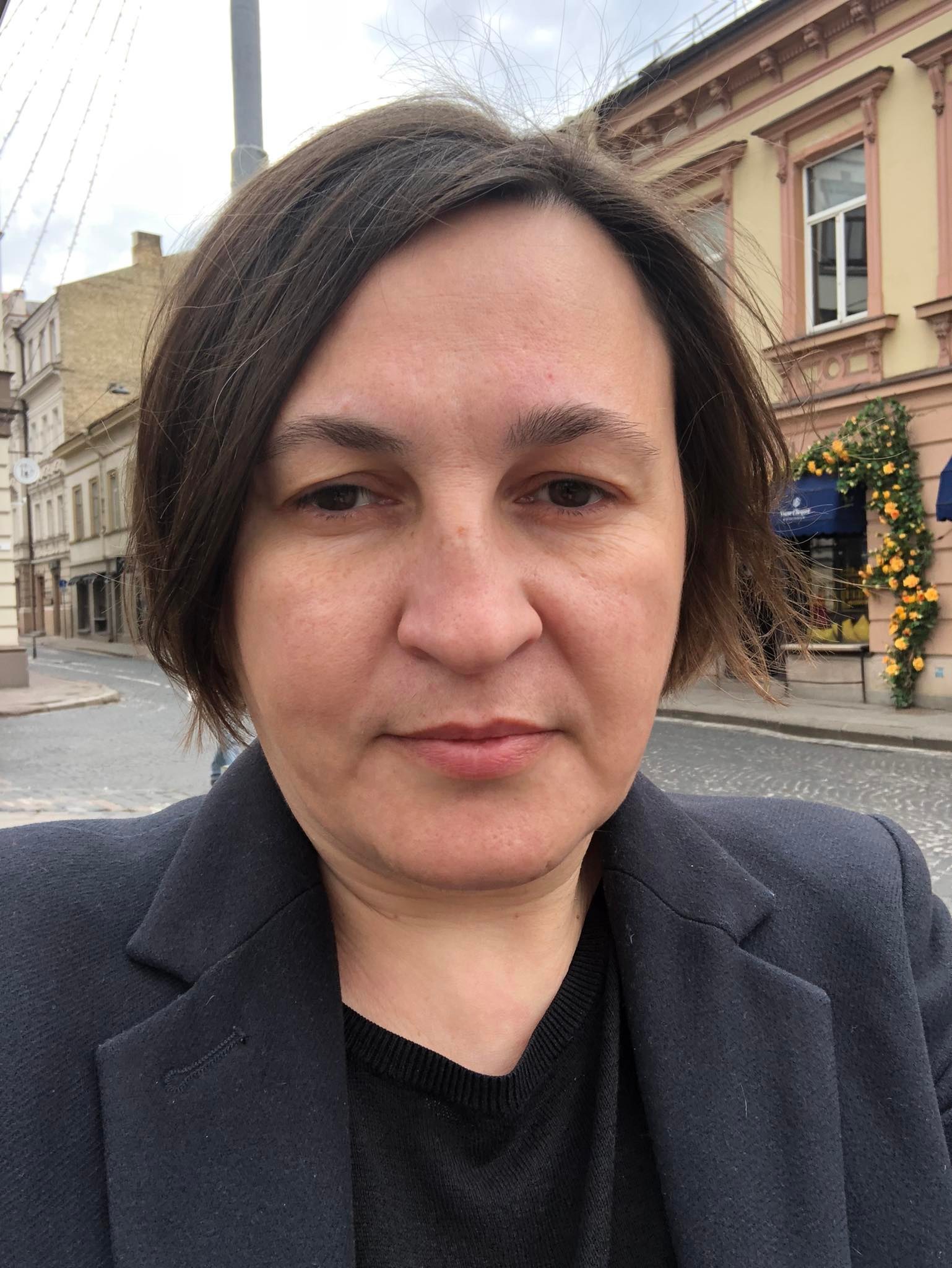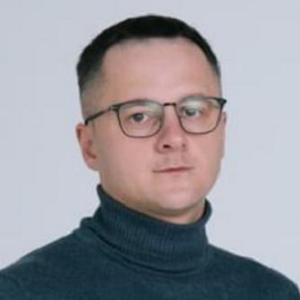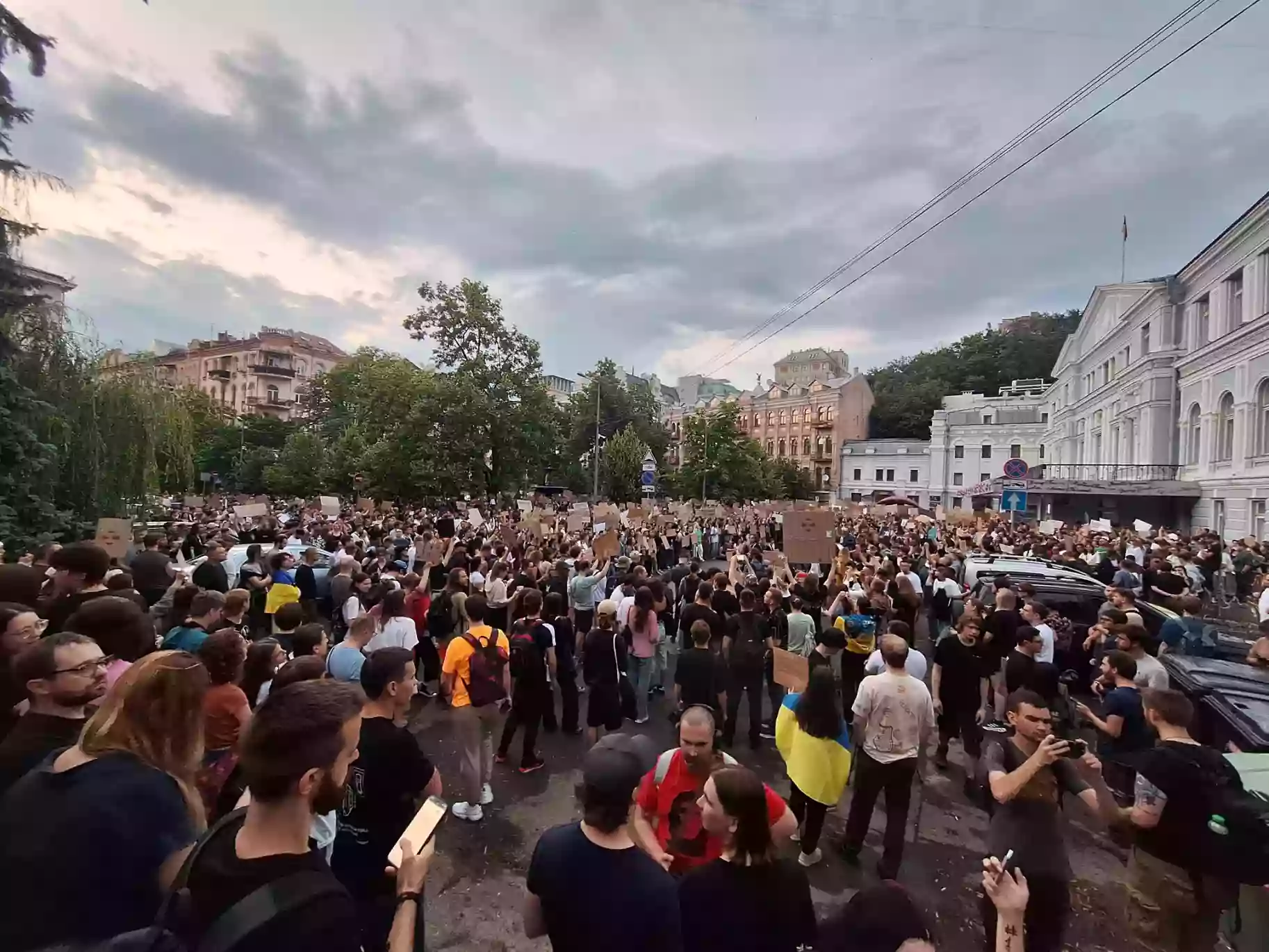


Українською читайте тут.
Protests against the adoption of Law No. 12414 were largely ignored on the national telethon (except for the "1+1" channel). At the same time, Suspilne covered both the protests and the overall developments surrounding SAPO and NABU.
On July 22, the Verkhovna Rada adopted in the second reading draft law No. 12414 “On Amendments to the Criminal Procedure Code of Ukraine regarding the specifics of pre-trial investigation of criminal offenses related to the disappearance of persons under special circumstances during martial law.” Although the draft law had been in parliament since January, last-minute amendments were introduced that were unrelated to its original subject. These amendments made the National Anti-Corruption Bureau (NABU) and the Specialized Anti-Corruption Prosecutor’s Office (SAPO) dependent on decisions made by the Prosecutor General.
On the same day, the adopted law was signed by both Parliament Speaker Ruslan Stefanchuk and President Zelenskyy. The law sparked a reaction from the European Union, which expressed concern over the erosion of independent anti-corruption institutions, as well as multiple statements from Ukrainian media and civil society organizations. For perhaps the first time since the beginning of the full-scale war, people in various cities took to the streets to protest the law’s adoption.
For days, the government did not comment on the law. It was only during a late-night address that the president said he had met with the heads of SAPO, NABU, the Prosecutor General, and the head of the Security Service of Ukraine (SBU) to discuss the effectiveness of these institutions. “The anti-corruption infrastructure will continue to function. But without Russian influence, everything must be cleansed of that. And there must be more justice,” said the president. However, Zelenskyy did not explain the urgency behind the law’s adoption and gave no real response to the protests or statements from Ukraine’s partners and civil society.
Detector Media analyzed how the adoption of the law and the events around NABU and SAPO — including the large-scale raids just before the law passed — were covered on the “United News” national telethon and on Suspilne’s First Channel.
The Telethon
Throughout Tuesday, July 22, coverage of the developments around NABU and SAPO on the “United News” telethon was minimal. And when these institutions were mentioned, the framing was along the lines of “everything is under control; no reason to worry.”
On the Inter channel, host Oleksandr Vasylchenko asked Valentyn Hladkykh — who had previously appeared on pro-Medvedchuk talk shows and is now an expert at the “United Ukraine” analytical center — about the raids on NABU detectives. Hladkykh said the SBU was simply fulfilling its legal duties by uncovering enemy agents wherever they may be. He framed the “cleansing” of the anti-corruption structure of Russian influence as “not destruction, as some have claimed, but an increase in efficiency.” He added that NABU “was built to be independent of common sense” and should be integrated into the system of checks and balances.
Anchor Anna Kamenieva discussed what she called an “unprecedented” scandal at NABU with political consultant Taras Zahorodniy. She asked, “Do you see any risks in law enforcement raiding other law enforcement bodies?” Zahorodniy smiled and replied, “That’s how it should be… Why are you so worried about FSB agents?”
Zahorodniy also spoke on the Rada TV block, hosted by Tetiana Honcharova. Rather than analysis, he mostly reiterated news headlines. Asked about the adoption of draft law No. 12414 and the reaction from NABU, SAPO, and civil society, he said, “This is part of a planned, systematic effort to root out enemy elements in all branches of government.” He claimed that in ten years, NABU and SAPO had not proven effective: “Just wait — we’ll soon hear many interesting stories about NABU.”
Another “United Ukraine” expert, Bohdan Popov (not to be confused with his father, Ihor Popov), echoed claims about the inefficiency of these bodies on the “We Are Ukraine” channel. He praised the SBU’s speed in “neutralizing Russian agents.”
Hosts Viktoriia Malosvitna and Bohdan Mashai also aired direct statements from Prosecutor General Ruslan Kravchenko and SBU head Vasyl Maliuk regarding the raids and possible reforms of NABU and SAPO.
Political scientist Oleksii Buriachenko (also formerly seen on Medvedchuk’s channels) said the Rada made the “right and consolidated” decision to “integrate NABU and SAPO into the unified law enforcement system.” Protesting, he said, was irresponsible during wartime and would be exploited by Russia.
That night, on “We Are Ukraine,” Valentyn Hladkykh was again given the floor, this time for a 15-minute monologue. He claimed that the SBU’s identification of Russian agents was evidence of its high efficiency. “So I don’t understand the reaction of NABU and SAPO leadership or activists. They should be thankful that the SBU is cleaning their institutions of harmful elements,” he said. “When these bodies were created after the Revolution of Dignity, I wrote that bacilli cannot create antibiotics. At the time, it was the result of a compromise, and the European Union's position also prompted the changes.” He added that the situation was being used for “political speculation.”
News anchor Oleh Paniuta briefly mentioned protests in major cities, including Kyiv, against the law.
Several times that night, the telethon aired clips of the president's address, in which he said he had spoken with the heads of SAPO, NABU, the SBU, and the Prosecutor General, promising that anti-corruption bodies would continue to function, but “without Russian influence and with more justice.” However, Zelenskyy said nothing specific — not about the law’s urgency, nor Ukraine’s EU accession prospects, nor the protests.
The issue received the most attention in the morning slot of “1+1” on July 23. In news segments hosted by Solomiia Vitvitska, reports were aired from the Verkhovna Rada, protest rallies, and international media outlets. Statements by Kravchenko and Maliuk were also broadcast.
Diplomat and Director of the Centre for Defense Strategies, Oleksandr Khara, sharply criticized the law, calling it “a major assist to Ukraine’s enemies abroad, particularly in the EU — people like Orban,” and warned that it might delay negotiations over Ukraine’s EU accession. Subordinating NABU and SAPO to a single official, he argued, does not strengthen anti-corruption efforts.
Transparency International Ukraine’s Executive Director Andrii Borovyk also said the new law effectively dismantled the independence of anti-corruption institutions.
Hosts Nata Ostrovska and Yevhen Plinskyi said they had invited MPs from the ruling “Servant of the People” party to comment, but received refusals. They expressed hope that lawmakers would still “find an opportunity to explain their position.”
In summary: if someone only watched the telethon and missed the “1+1” morning slot, they likely didn’t learn about the protests, international reactions, the law’s consequences — or even the “small details.” For example, that the amendments were inserted into a bill that originally had nothing to do with NABU or SAPO, that it was rushed through via a fast-track procedure, and that one of the bill’s sponsors didn’t vote for it.
Suspilne’s First Channel
On July 22, Suspilne’s First Channel provided nearly continuous coverage of developments related to NABU and SAPO.
Anchors aimed to present all sides, quoting official statements and social media posts from the heads of the SBU, NABU, G7 representatives, EU officials, and MPs from various factions.
There were live reports from the court where NABU employees Husarov and Mahomedrasulov were having preventive measures decided, from the Verkhovna Rada during the vote on draft law No. 12414, and from NABU head Semen Kryvonos’s briefing.
The legal changes were analyzed by MPs Ivanna Klympush-Tsintsadze (European Solidarity), Anastasiia Radina (Servant of the People), Yuliia Tymoshenko (Batkivshchyna), and Yaroslav Zhelezniak (Holos), as well as by the hosts themselves.
Most of the guests were MPs rather than legal or political experts. Opinions varied widely — even within the same faction. Nina Yuzhanina (European Solidarity), who supported the bill, said such subordination exists in many countries, the Prosecutor General should bear responsibility, NABU retained its powers, and EU aid would continue — so nothing dramatic had occurred. In contrast, her colleague Viktoriia Siumar insisted on defending NABU and SAPO’s independence, calling corruption the second-biggest threat after war and warning that the law could damage Ukraine’s international support.
Daria Kaleniuk, Executive Director of the Anti-Corruption Action Center, told hosts Ihor Tatarchuk and Yuliia Terletska that the new subordination equaled the institutions’ destruction and was a “return to 2013 and Yanukovych-era policies.”
Other guests — MPs Oleksii Kucherenko (Batkivshchyna), Andrii Osadchuk (Holos), and Ruslan Horbenko (Servant of the People) — offered more restrained assessments. Horbenko cited a poor performance audit of anti-corruption institutions. Kucherenko said the reform wasn’t a liquidation, but there couldn’t be two separate prosecutorial branches. Osadchuk admitted he hadn’t seen the amendments in time, so he abstained, but acknowledged errors in the anti-corruption system that need correcting.
From 8:00 to 9:00 PM, Suspilne aired a special broadcast dedicated to the law. It included all previously shown MP comments, footage of tribune blockades, reactions from international partners (including a Radio Free Europe correspondent in Brussels), and ongoing or archived footage from protests in multiple cities. Analyst Ihor Chalenko joined hosts Anatolii Yerema and Inna Moskvina, calling the bill “Frankenstein’s monster” for combining unrelated amendments, and suspected decisions were pre-agreed at a National Security Council meeting.
A sharp exchange occurred when Ivanna Klympush-Tsintsadze (European Solidarity), Yaroslav Yurchyshyn (Holos), and Yurii Kamelchuk (Servant of the People) joined the show. Klympush-Tsintsadze called the law a rollback to Yanukovych’s era and a blow to Ukraine’s EU path. Host Yerema, usually neutral, suddenly asked Kamelchuk, “Why are you destroying institutions, Mr. Yurii?” Visibly offended, Kamelchuk loudly insisted these bodies were inefficient and costly and recounted how he was once investigated by NABU, but the case went nowhere. He thanked young people for protesting and urged them to “figure things out.”
Yurchyshyn, speaking live from a protest near the Ivan Franko Theater, responded, “The youth already figured it out — that’s why we’re out here.”
The special broadcast also showed excerpts from SAPO and NABU leaders’ briefings and parts of the Prosecutor General and SBU head’s briefing — which happened during the program.
On July 23, Suspilne continued its in-depth coverage, ensuring viewers of the First Channel had a full picture of events — and perhaps even some insight into the motives behind them.
Photo: Dmytro Desiateryk, protest in Kyiv on July 22


